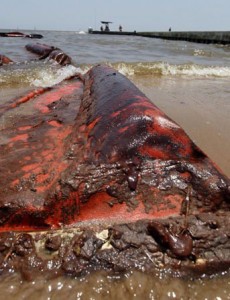The Gulf Oil Spill
By Lisa Trimarchi | July 17th, 2010 | Category: Columns, Insights | Comments Off on The Gulf Oil SpillInsights
I become angry when I think about the oil spill in the Gulf. Not only did eleven people die when the BP Deepwater Horizon offshore oil rig exploded on April 20, but over 2 million gallons of oil have spilled per day since, disturbing the balance of countless varieties of wildlife that may die and become extinct because of a lack of foresight by BP. Were they thinking about worse case scenarios? No, and as a result, the Gulf has been dubbed a social sacrifice zone due to the many lives that are adversely affected by the devastation that will continue to the economy and ecology.
 It is foolish to believe that we can continue to ravish the earth and the earth not fight back. Oh, it may seem she is a passive victim. But when we try to breathe fresh air, drink clean water, and gather food from her rich stores, she will come up empty, having shown that by simply standing still, she has made the final blow. It may take many years for the Gulf to completely recover. Oil-consuming microbes may work to consume the oil in the warmer, shallower waters, but may not be as effective in the cooler, deeper waters.
It is foolish to believe that we can continue to ravish the earth and the earth not fight back. Oh, it may seem she is a passive victim. But when we try to breathe fresh air, drink clean water, and gather food from her rich stores, she will come up empty, having shown that by simply standing still, she has made the final blow. It may take many years for the Gulf to completely recover. Oil-consuming microbes may work to consume the oil in the warmer, shallower waters, but may not be as effective in the cooler, deeper waters.
What that will mean is that people will have lost their livelihoods, and the devastation to the habitat could last generations. Will we take responsibility to find an alternative to fossil fuels?
I will. Now I ride my bike almost everywhere. I take public transportation and try to use packaging materials that are earth-friendly, like clay, glass, and paper. I open a window, use a fan intelligently, and use the air conditioner at a higher temperature.
I remember telling a friend that we continue to pollute and destroy the planet because we delude ourselves into believing that our individual plots of earth are safe, and we can get away with trashing our neighbors’ backyards. It doesn’t affect us. It is so far away. Who cares about them anyway? I live in California. The spill is in the Gulf of Mexico.
The problem is pollution doesn’t remain where we pollute. Ocean currents move pollutants into sensitive areas in Louisiana, Texas, Alabama, and even Florida. Also, as we deplete an area’s resources, there are political consequences. Carelessness has disastrous results. Consequently, we need to manage our resources carefully. On a more minute level, we have to pay claims to those who’ve lost their lives in backyards where we’ve tossed our refuse and which undermines the infrastructure of our society. We need to limit our use of oil. We are in a period of resource winter and need to stretch our resources with greener sources of energy so we can extend our supply.
The Gulf of Mexico is very important to this country. It is the ninth largest body of water in the world, and its fisheries are some of the most productive in the world. Its production of shrimp is 73%, and its production of oysters is 59% of the total U.S. production.
In terms of habitat, Gulf habitats include coastal wetlands, submerged vegetation, important upland areas, and marine/offshore areas. Encompassing over five million acres (about half of the U.S. total), the Gulf’s coastal wetlands serve as an essential habitat for numerous fish and wildlife species, including migrating waterfowl (about 75% traversing the U.S.), seabirds, wading birds, fur-bearers, and sport and commercial fisheries. (www.epa.gov/gmpo/about/facts.html)
Ruined. All ruined not only by the decisions and actions of one company but also by the decisions and actions of all of us. We have to wake up and realize that we do not have the same planet we had thirty years ago. We’ve ruined so much of the earth that we are running out of places to toss our refuse. The garbage has made it to our own backyard, and we need to minimize our mistakes in resource management.
Individually, we need to remain conscious of how we use the earth’s resources. Upon becoming conscious, we need to use strategies to limit our use of fossil fuels completely because we cannot afford to keep defecating in our neighbors’ yards. We are effectively defecating in our own.
If we examine that we have everything we need, and we don’t need another bigger larger car, another bigger larger home, but that what we have is enough, that is the first step of getting out of jeopardy and turning the corner to improving our planet.
As spoken by Lao Tsu in the Tao Te Ching:
Those who know they have enough are truly wealthy.
Those who persist will reach their goal.
Those who keep their course have a strong will.
Those who embrace death will not perish,
but have life everlasting.
We must look at what we have and consider that it is enough. We must remain steadfast in needling the oil companies to retrieve resources wisely. We must encourage our government to find greener sources of energy. We must embrace the death of our current ways of living to create a better, greener earth.








